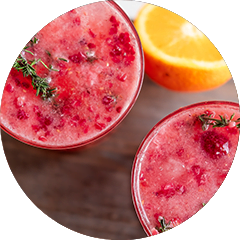From the edge of the Red Sea to the Syrian border lies the Kingdom of Jordan, a long-standing cultural hub and a crossroad for many generations of travelers and nomadic peoples. While the streets are filled with a blend of diverse cultures, languages, and accents, the area’s native Bedouin tribes keep their proud heritage and traditions alive, especially in the unique cuisines offered in the area.
Here are some of the can’t miss foods and dining experiences you’ll find in Jordan.
Bedouin Tea and Coffee

Hidden deep within a desert valley lies the ancient Nabatean city of Petra. Undiscovered by Europeans until the early 19th century, the city now sees thousands of daily tourists during the busy season. Tucked away just off the main trail, you’ll need a keen eye to find the Bedouin tents that are hidden along even the steepest paths, but you’ll be greatly rewarded for your efforts. Hospitality is an integral part of Bedouin culture, as is the sharing of tea, and many travelers are invited in to enjoy both. Bedouin tea is traditionally sweetened and aromatic, served in small glasses with sage, and the refills are plentiful. Coffee is also available in many of these tents, though it's not the traditional choice.
Fattet Hummus
This creamy rich hummus is a welcome variation on the traditional hummus we all know. It shares the traditional base of pureed Chickpeas, but it’s mixed with tahini, pine nuts, and torn bits of pita bread before being topped off with olive oil.
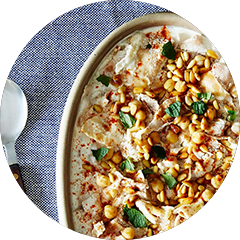
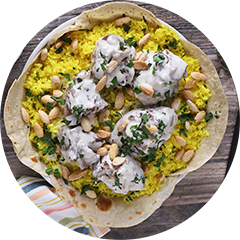
Mansaf
Mansaf is the national dish of Jordan, with roots deep in the Bedouin and cultures of other nomadic tribes. But its popularity transcends borders, with regional recipes appearing from Israel to Iraq. It is traditionally a communal dish served on a large platter comprised of tender meats (usually lamb), layered with thin flatbread and piles of fresh aromatic rice. The dish is often garnished with an assortment of toasted nuts and served with jameed, a tangy yogurt sauce. Variations of the dish include different rice and flatbreads, with some opting to replace the lamb with camel or chicken.
Falafel
Falafel is a dish that is already familiar to many travelers thanks to its growing global popularity. Falafel is a crisp ball formed from ground chickpeas and spices, often sold as street food for a light meal or snack. Falafel can be enjoyed on its own or served between bread as a sandwich filling, with yogurt sauce, tomatoes, raw onion, and generous servings of fresh mint.
Hashem Restaurant is the best place to get falafel and one of Jordan’s hidden gems. Located off the beaten path in a narrow alleyway, Hashem provides falafel to countless visitors and even hosts Jordan’s royal family on occasion.
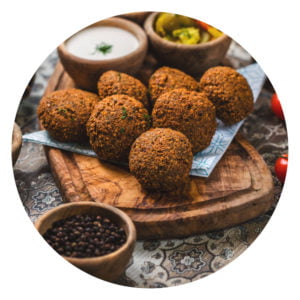
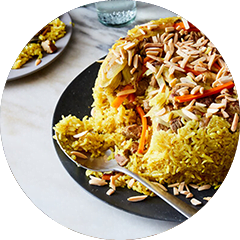
Maqluba
Maqluba is a hearty traditional comfort food that dates back as far as the thirteenth century. It is comprised of rice, chicken, potatoes, and vegetables that have been slow cooked over a fire, and as the name implies, the presentation is key, with the dish being inverted at the table. With a skilled chef, this will result in a neat rice cake that covers a bed of rich meat and vegetables.
Roasted Nuts
Roasted nuts are popular street food in Jordan, with roasters located all over the marketplaces. Assorted nuts are heated and combined with spices, sugar, and salt depending on what flavor you choose. Many roasters offer a side of fresh fruit as well, which is highly recommended, as fresh Medjool dates make an excellent complement to the savory saltiness of the nuts. In fact, three-quarters of the world's dates are grown in the Jordan valley.
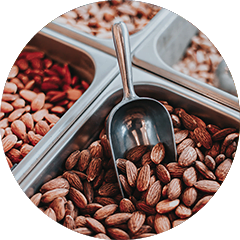
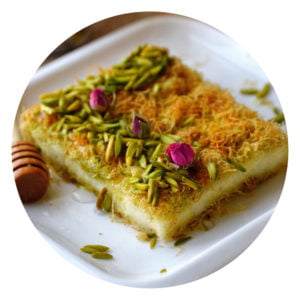
Kunafa
After a savory lunch, Kunafa is a perfect follow up dessert. Served as an assortment, choose between crisp pastries filled with cheese or cream and served with a syrupy topping, alongside cups of thick Turkish coffee. Kunafa is a favorite treat for special occasions, but it's also a phenomenal afternoon indulgence.
Fresh Juice
This juice isn’t what you might find at the supermarket. Instead, it's comprised of freshly harvested pomegranates, olives, lemons, dates, and sugarcane depending on the season. Fruit juice is pressed by hand and served unsweetened, making it a perfect palate cleanser after a dessert of rich Kunafa and Turkish Coffee. Sugarcane is pressed by metal rollers in the streets and served in a sturdy glass mug, then topped with sweet froth. And yes, it's as good as it sounds.
